Federal rollbacks and freezes shrink Vermont energy grants and credits, witnesses say

Summary
Federal policy changes in 2025 have reduced or delayed a range of clean‑energy incentives and grants Vermont officials had counted on, witnesses told the House Committee on Energy and Digital Infrastructure on Oct. 30.
Federal policy changes in 2025 have reduced or delayed a range of clean‑energy incentives and grants Vermont officials had counted on, federal and state witnesses told the House Committee on Energy and Digital Infrastructure on Oct. 30. Rebecca Ellis, state director for Sen. Peter Welch, and Ethan Hinch, senior policy adviser for Sen. Bernie Sanders, said the combined effect of congressional rescissions and executive cancellations narrows state options for weatherization, rooftop solar and other programs.
Ellis reviewed four major federal packages that have shaped recent state plans: the American Rescue Plan Act, the Bipartisan Infrastructure Law (also called the Infrastructure Investment and Jobs Act), the Inflation Reduction Act (IRA), and the recently enacted measure widely referenced in testimony as the "1 Big Beautiful Bill Act" (OBBBA). "The OBBBA," Ellis said, "moved us back to where we were before" the IRA in projected emissions and in many of the incentives available to states.
Ethan Hinch told the committee that the Biden‑era funding picture and later actions by the current administration are distinct: some funding was legally rescinded in the OBBBA passed by Congress, while other previously obligated and agency‑administered funds were cancelled or frozen administratively. Hinch summarized broad figures for those administrative actions, saying the administration has frozen or canceled funding across hundreds of federal programs and highlighted changes to Department of Energy and EPA funding streams. "Taking away funding from the people of a state because they didn't vote for you is illegal, outrageous, and unconstitutional," Hinch said about targeted cancellations he described.
Hinch and Ellis identified several programs directly affecting Vermont. Rebecca Ellis cited the Vermont Department of Public Service summaries showing weatherization and residential appliance rebate funding from the IRA is paused; the EPA's Solar for All program — a roughly $7 billion national program — was terminated by EPA action, eliminating an expected roughly $62 million allocation for Vermont intended to serve lower‑income households. Hinch said the EPA termination and additional DOE/OMB project cancellations have affected Vermont beneficiaries, naming university and private projects that had been scheduled to receive funds.
Brian Law, associate director for energy at the National Conference of State Legislatures, said the federal tax‑credit changes in recent legislation have bifurcated incentives by energy source and timing, with some credits retained for nuclear, geothermal, hydro and energy storage while residential rooftop credits and some EV credits have expired or will lapse sooner than previously expected.
Committee members asked witnesses whether federal offices can reverse cancellations and how long recovery might take. Ellis said some responses have been litigation and direct negotiations with federal agencies; Hinch and others noted ongoing lawsuits and legal clinics assisting affected recipients. Witnesses promised to follow up with the committee to supply source links and more precise breakdowns of the figures discussed.
Why it matters: the combined effect of rescinded legislative incentives and administrative cancellations reduces near‑term federal resources available to Vermont for weatherization, rooftop solar and workforce training. That has implications for state implementation timelines, local contractors and low‑income households that were prioritized for targeted programs.
Reporting notes: quotes and attributions in this account come from testimony by Rebecca Ellis, Ethan Hinch and Brian Law to the House Committee on Energy and Digital Infrastructure on Oct. 30, 2025. Several committee questions requested follow‑up for precise dollar totals or program‑level status; where witnesses provided approximate numbers the article notes those as described on the record.

